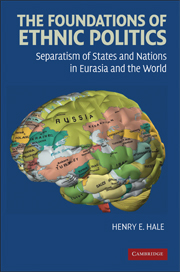11 - TOWARD A GENERAL THEORY OF ETHNIC CONFLICT AND SOLUTIONS
Published online by Cambridge University Press: 05 September 2012
Summary
This book has made two core arguments. First, it has contended that social science will best advance with a new fundamental theory of what ethnicity is and why it is what it is, a theory grounded solidly on psychological research into human behavior. Second, it has proposed a candidate for such a theory, a relational theory that is based on the following premise: Ethnicity is driven by uncertainty reduction, whereas ethnic politics are driven by interests. This approach was shown to be capable of underpinning a new theory of national separatism that has logical and empirical advantages over existing theories. In fact, Part II of this volume demonstrated it was capable of significantly revising standard understandings of one of modern history's most momentous sets of events: the breakup of the USSR, the continued failure of reintegration efforts in the CIS, and the separatism that lies behind such developments. Separatism arguably follows similar patterns elsewhere in the world.
The implications of the relational theory of ethnicity are not limited to national separatism, however. After summing up the conclusions of the preceding chapters and relating them to worldwide patterns of separatism, this concluding chapter distills a core logic from the analysis of separatism to posit what a general relational theory of ethnic conflict might look like. Such a theory is shown to have promise for illuminating prospects for multiethnic state collapse, international integration failures, and various forms of deadly ethnic violence, drawing on suggestive examples from across the world.
- Type
- Chapter
- Information
- The Foundations of Ethnic PoliticsSeparatism of States and Nations in Eurasia and the World, pp. 241 - 264Publisher: Cambridge University PressPrint publication year: 2008



